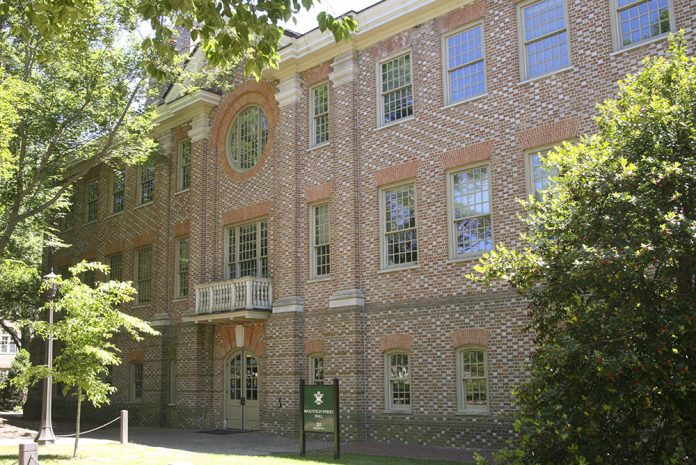Students, faculty and community members gathered in McGlothlin-Street Hall’s basement to see Margaret Leinen, the director of the Scripps Institute of Oceanography, speak about climate and oceanic changes March 12. As part of the College of William and Mary’s ongoing lecture series dedicated to celebrating the 100th anniversary of coeducation, Leinen’s unique perspective as a woman in STEM provided insight on the most pressing issues facing the environment.
Leinen’s talk focused on two aspects of the earth’s future, specifically changes affecting oceans, and changes to the earth’s climate and long-term sustainability. Leinen emphasized the interconnectivity between the earth’s oceans and its climate. She detailed the negative changes currently affecting the world’s oceans, while also illustrating their effects on broader climate conditions in both the short-term and long-term future.
Leinen began her talk by emphasizing what she believes to be the important role of women in science and the workforce. She explained how women and men think differently, and how the combination of the two pushes better scientific discovery.
“Women do think differently from men, and it’s mostly because they bring different experiences to the problems that they solve,” Leinen said. “Scientific discovery moves more rapidly when both women and men are on the teams of science … it’s not just checking a box for political correctness; this is how we’re going to solve a lot of problems, by working together.”
“Scientific discovery moves more rapidly when both women and men are on the teams of science … it’s not just checking a box for political correctness; this is how we’re going to solve a lot of problems, by working together.”
Leinen explained how specific aspects of climate change, like the gradual increase of nighttime temperatures, are especially dangerous for environmental protection. She explained how important it is for nighttime temperatures to remain cool and warned audience members of the drastic effects that increased temperatures in evening hours pose to our wellbeing.
“We’ve changed the way heat waves work. The thing about high temperatures at night is that we as people depend on nighttime always cooling down,” Leinen said. “Nighttime temperatures that are higher are much more impactful for human health, and for mortality than our high temperatures during the day.”
Leinen then discussed the interconnectedness of the climate and the ocean, and the impacts that their shared relationship has on the environment. She also specified that rising carbon dioxide levels are the direct source of these environmental changes to our climate, and that intensified emission outputs are the largest threat to earth’s livelihood.
“Every level, whether it’s climate in general, or whether it’s the big storms that affect us, the ocean is right there, side by side with climate change in its influence,” Leinen stated. “… We know from every source of scientific information available to us, whether it’s observations, whether it’s experiments, or whether it’s models, that it is the carbon dioxide, by and large, that is the source of this increasing temperature.”
Near the end of the talk, Leinen shared her faith in future generations due to their ability to make tangible, lasting positive changes for the environment.
“You are the ones that are going to help us solve this,” Leinen said. “… It’s also understanding how to talk about very different people about the magic that’s out there, not just in the ocean but in the world about our responsibility to protect it.”
Gil Osofsky ’20 attended the lecture and shared afterwards how he believed people’s attitudes towards these facts need to change for real improvements to be made.
“We know for sure that CO2 emissions cause climate change; the problem then lies with people who are not willing to listen to science,” Osofsky said. “… There’s no problem with the science, the problem is with getting people to listen and understand.”
“We know for sure that CO2 emissions cause climate change; the problem then lies with people who are not willing to listen to science,” Osofsky said. “… There’s no problem with the science, the problem is with getting people to listen and understand.”
Associate Dean of Academics at the Virginia Institute of Marine Science Linda Schaffner helped organize this event. Schaffner talked about the expertise Leinen has to offer and why they choose her to speak as part of the College’s 100 Years of Women celebration.
“Dr. Leinen is considered one of the leaders in the field of ocean sciences … I just think that we couldn’t find anyone better to come speak about the ocean and help use celebrate 100 years of women,” Schaffner said. “She’s been a strong advocate for equity and diversity in the field of marine and ocean sciences for [her] entire career. She embodies everything we wanted to celebrate during this 100 years.”
After the talk, Schaffner shared how she felt inspired and hopeful for the future generation, and their dedication to positive change.
“What Dr. Leinen sees in the students who are in college now, their commitment to environmental issues and to try to work towards understanding science and finding solutions … it’s going to be these next generations coming up to tackle those kinds of issues and help us find solutions to the problems.”

